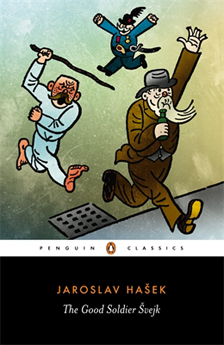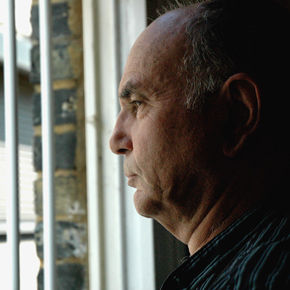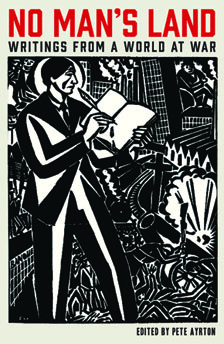The world’s affliction
by Pete AyrtonIn collecting material for No Man’s Land, my first priority was to feature writing from as many of the countries that took part in World War One as possible. This not from some desire to be exhaustive but because I wanted to convey that the war truly was a world war – so there are contributions from writers from twenty countries. The pieces in the book cover the fighting in all the theatres of the war: of course the Western Front, but also the Eastern Front, the Balkan Front, the Italian Front, Gallipoli and the War at Sea.
They also cover the experiences of the men and women left behind on the home front, of the women on the war front and of the soldiers who returned home never able to forget what they had endured. Because they come from many countries, the pieces reflect very different attitudes to the idea of nationhood and very different motivations for fighting the war.
For the British, French and Germans who wrote about the war, their attitude was relatively straightforward. Whatever the historical facts, almost all of them felt loyalty to a well-defined nation which they took to be morally superior to other nations and whose war effort they supported. A small minority opposed the war but this was more because they took war of any kind to be evil than from the belief that other nations were morally equal to their own.
For combatants from other countries, the nation-state was more recent and/or more contested and they had a much more fragile commitment to nationhood and empire.
The tensions in the Italian army, for instance, reflected the fact that Italy was united only in 1861 and that the creation of Italian nationalism was a work-in-progress. In Emilio Lussu’s A Soldier on the Southern Front, the officers went into battle with the shout “Savoy!”:
Now that I was calm again, I could see all that was going on around me. Officers and men were falling with their arms flung wide and their rifles hurled so far in front of them that it seemed as though a battalion of dead men was advancing. Captain Bravini never stopped shouting: “Savoy!”
A subaltern of the 12th, red in the face, passed near me, clutching his rifle. He was a republican, and disliked the monarchial war-cry that we used in attack. Seeing me, he shouted: “Long live Italy!”
There is no doubt that the scenes of mutinous hatred described by Lussu were fuelled by the soldiers’ sense of grievance at being led by an officer class whose loyalty to the Italian nation was, in their eyes, doubtful.
For those fighting in the Austro-Hungarian army, loyalty to empire was weak. In Liviu Rebreanu’s The Forest of the Hanged, Lieutenant Bologa is a brilliant officer whose bravery will be rewarded by a Gold Medal bestowed on him by General Karg, who wants to take him with him on his next campaign to Ardeal in Romania. Apostol is not keen on going.
“Very well, very well,” repeated the general thoughtfully. “Though I don’t understand why you should not want to come with us. My division has a holy mission in Ardeal! A great mission. Yes! The enemy has stolen our country’s soil. There the Wallachians…”
Suddenly General Karg stopped short as if a ray of light had entered his brain. He again took a few steps backwards and glued his gaze on Bologa, trying to read his innermost thoughts. For several seconds there reigned a grave-like silence in the room, while outside could be heard the grinding of cart wheels and the noisy chirping of the sparrows in a tree under the office window. Apostol unconsciously closed his eyes to protect himself from the general’s scrutiny.
“You are a Romanian?” the latter jerked out abruptly, his voice almost hoarse.
Bologa is prepared to fight valiantly but draws a line on going into battle against his kith and kin. Certainly, the effectiveness of the Austro-Hungarian army was undermined by its need to enlist combatants from its ethnic minorities.
The eponymous hero of Jaroslav Hašek’s The Good Soldier Švejk has a wry, sardonic attitude to the loyalty demanded by his commanding officers:
 “His Imperial Majesty must be completely off his rocker by this time,” declared Švejk. “He was never bright, but this war’ll certainly finish him.”
“His Imperial Majesty must be completely off his rocker by this time,” declared Švejk. “He was never bright, but this war’ll certainly finish him.”
“Of course he’s off his rocker,” the soldier from the barracks asserted with conviction. “He’s so gaga he probably doesn’t know there’s a war on. Perhaps they’re ashamed of telling him. If his signature’s on the manifesto to his peoples, then it’s a fraud. They must have had it printed without his knowledge, because he’s not capable of thinking about anything at all.”
“He’s finished,” added Švejk knowingly. “He wets himself and they have to feed him like a little baby. Recently a chap at the pub told us that His Imperial Majesty has two wet nurses and is breastfed three times a day.”
“If only it was all over,” sighed the soldier from the barracks, “and they knocked us out, so that Austria at last had peace!”
And both continued with the conversation until Švejk condemned Austria forever with the words: “A monarchy as idiotic as this ought not to exist at all…”
If the patriotism of Europeans fighting varied greatly, for many of the Indians and Africans enlisted in the imperial armies it was nonexistent. For some, the links were primarily monetary – they went to fight in the hope that they would come back from the wars with financial rewards and even a pension; for others there was the hope that the imperial nations would recognise the contribution made to the war effort by the soldiers from the colonies and implement political and economic reforms. As Mulk Raj Anand writes in Across the Black Waters:
And once now in a while in a district arrived a hero, a man who had earned both a pension and a medal attached to it. And soon he became a legend and people came to see him, the wonder, especially as he had left an arm, a leg or an eye behind, and used a miraculous wooden substitute…
Information about rewards was, therefore, the chief preoccupation of the sepoys, talking about it their main consolation in exile, the inspiration of it what spurred them on to battle. How happy would be the dear ones at home if only a ready sum could help to pay even a tenth part of the moneylenders’ interest and towards the repair of the roof which had been washed out by the last monsoon before the drought!
It was the same for many of the African soldiers – they were rewarded poorly and their expectations of a better life when they returned home after the war were not fulfilled. In Mahmadou Fofana, Raymond Escholier writes that the silver ring given by Samba Kamara’s brother was
…all that would be left to the dead man of the village he had so much hoped to see again.
I must admit that to my sadness was added remorse. I felt the revolt that had found no place in the simple, docile soul of Samba Kamara. What gives us whites the right to remove a black man from the peace of his field to involve him in our quarrels, in our hatreds.
Yes, I know how the story goes: “We are tearing these people from Barbary, we are letting them enjoy the fruits of civilisation. When the crunch comes, they must payback their debt: we share the same course.”
Whatever a soldier’s relationship to the army he was fighting in, the war marked a crucial period in his life – for many millions it also marked his death. Of the soldiers who survived the war and are written about in No Man’s Land, some returned reduced by injury, others never were reconciled to the horrors they had witnessed and how the war had made them unfit for the return to civilian life. The ambulance-driver narrator in Helen Zenna Smith’s Not So Quiet: Stepdaughters of War finds contemplation of the return unbearable:
Home, home… and I do not care.
I do not care. I am flat. Old. I am twenty-one and as old as the hills. Emotion-dry. The war has drained me dry of feeling. Something has gone from me that will never return. I do not want to go home.
I am suddenly aware that I cannot bear Mother’s prattle-prattle of committees and recruiting-meetings and the war-baby of Jessie, the new maid; nor can I watch my gentle father gloating over the horrors I have seen, pumping me for good stories to retail at his club to-morrow. I cannot go home to watch a procession of maimed men in my dainty, rose-walled bedroom. It is no place for a company of broken men on parade…
For some on the home front, what happened during the war was confirmation that society had to change – that other ways of organising it were possible. Those who saw this were a minority that had to make their voice heard, such as Rose Allatini, writing as A.T. Fitzroy in Despised and Rejected:
We’re few; that doesn’t matter. We shall be pilloried; that doesn’t matter. All that matters is that we shall have striven against what our brains and our hearts recognised as evil – Oh, not only evil, but stupid and petty and beastly – and we shall have done our bit towards bringing nearer the day when militarism will be supplanted by industry, and we may hope to have an international system of legislation that’ll knock out the possibility of disputes having to be settled by barbarous and unintelligent means of bloodshed.
As the war went on, the minority grew and was joined by the many disillusioned soldiers who returned home determined to make sure the suffering they had endured would not be in vain. So, the post-war period was in many of the countries involved in the war a period of revolutionary fervour and/or democratic reform.
No Man’s Land begins with the declaration of war being declared in Henri Barbusse’s Under Fire:
“It’s the French revolution all over again.”
“Crowned heads beware!” murmurs another.
And a third man adds:
“Perhaps it is the war to end all wars.”
There is a pause, then a few brows shake, still pale from the wan tragedy of a night of perspiring insomnia.
“An end to war! Can that be? An end to war! The world’s affliction is incurable.”
At the end is the narrator of Erich Maria Remarque’s All Quiet on the Western Front:
But perhaps all these thoughts of mine are just melancholy and confusion, which will be blown away like dust when I am standing underneath the poplars once again, and listening to the rustle of their leaves. It cannot have vanished entirely, that tenderness that troubles our blood, the uncertainty, the worry, all the things to come, the thousand faces of the future, the music of dreams and books, the rustling and the idea of women. All this cannot have collapsed in the shelling, the despair and the army brothels.
The trees here glow bright and gold, the rowan berries are red against the leaves, white country roads run on towards the horizon, and the canteens are all buzzing like beehives with rumours of peace.
In between, there is the carnage and destruction of the four years of a war that determined the history of the 20th century. The war changed all aspects of people’s lives – it changed the relations between the classes, between the sexes and between races in Europe and beyond. It led to the growth of the evils that spread through Europe in the following decades: fascism, communism, anti-Semitism and genocide. And it redrew geographical boundaries giving the victors the spoils of victory and amputating the territories of the defeated. This geographical settling of scores was fundamentally unstable – it rewarded the more powerful, it showed that might is right. And its creation of ethnic minorities all over Europe led to many of the major conflicts of the last hundred years, including, of course, the Second World War.
Editing No Man’s Land has been an up-and-down journey that required much reading that chronicled the relentless brutality of mankind, but it also provided many occasions of wondrous surprise that showed the power of human beings to express solidarity and kindness in conditions of great adversity. It also enabled me to discover authors who realised they were writing on the cusp of an epochal moment in which change – in its social, political and artistic forms – was possible and who fully embraced the moment. Carlo Emilio Gadda and Mary Borden were the contemporaries of Stravinsky and Webern, Klee and Leger, Frank Lloyd Wright and Mies van der Rohe – but that is another story.
One hundred years after the beginning of the war, the celebration of the anniversary, a building block of our national identity, is contested terrain. If this anthology helps to remind us that the war was truly international, then it will have achieved its aim.
From the introduction to No Man’s Land, published by Serpent’s Tail.
 Pete Ayrton was born in London in 1943. After studying and briefly teaching philosophy, a period of left-wing tourism in France and Italy led to his learning to read and converse in these languages, and to take part in the intense, opaque discourses of Marxism. A period of work as translator led to a job as editor with Pluto Press and to his founding in 1986 of Serpent’s Tail with the specific remit of publishing fiction in translation, of which two First World War classics, Frederic Manning’s Her Privates We and Gabriel Chevallier’s Fear, are both represented in No Man’s Land. Read more.
Pete Ayrton was born in London in 1943. After studying and briefly teaching philosophy, a period of left-wing tourism in France and Italy led to his learning to read and converse in these languages, and to take part in the intense, opaque discourses of Marxism. A period of work as translator led to a job as editor with Pluto Press and to his founding in 1986 of Serpent’s Tail with the specific remit of publishing fiction in translation, of which two First World War classics, Frederic Manning’s Her Privates We and Gabriel Chevallier’s Fear, are both represented in No Man’s Land. Read more.


